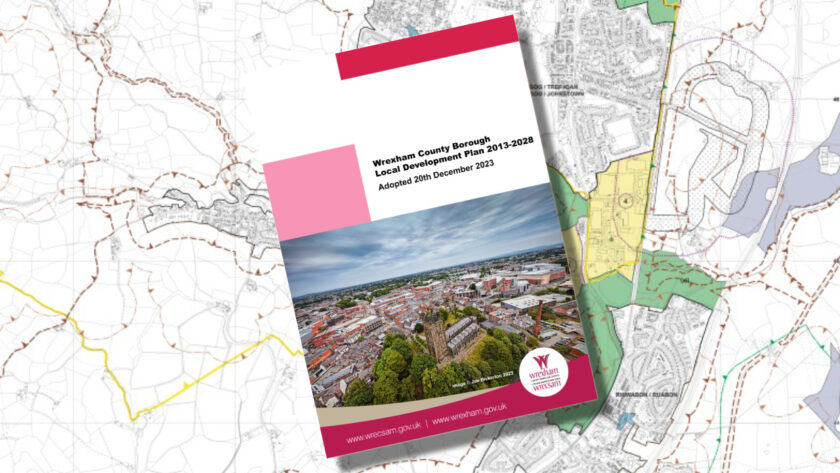Judge slams councillors in LDP judgement for “taking up court time” amid backlog of cases

A long awaited detailed judgement has been circulated locally in the Developers v Wrexham Council Local Development Plan case.
The LDP has now since been adopted following the direction of the court before Christmas – however the details of the full decision making and conclusions have now been circulated to councillors.
The outcome is nothing new. However there are several sections of new information now public, including the Judge effectively telling off those who made a court case necessary for using up court time.
It had also previously been made public that there were several developers involved as claimants, however they are now named as BDW Trading Ltd, Bloor Homes Ltd, Redrow Homes Ltd, Harworth Estates Investment Ltd, Russell Homes UK Limited, Castle Green Homes Limited and SG Estates Limited.
The in the documents the Judge notes: “The Claimants are various developers who have interests in land affected by the LDP.
“As a consequence they have an interest in the LDP being approved and, therefore, clearly have sufficient standing to bring these proceedings.”
“Wrexham County Borough Council” is stated as the defendant.
The Judge states: “The Council acknowledged service of the proceedings and at section 1 of the Acknowledgement of Service the box saying, ‘I do not intend to contest the claim’ was ticked.”
Related, he later adds: “The matter came before HH Judge Jarman KC for consideration of permission on the papers.
“He gave permission and set out directions. These included a time for the Defendant to file written evidence and a period of time for any challenge to be made to the Claimant’s skeleton argument in due course.
“The Council has not put any material before the court and has chosen not to contest these proceedings. It has not, however, consented to the relief sought by the Claimant.”
The Judge also later notes: “The Welsh ministers were joined as an interested party and they also acknowledged service indicating that they did not intend to contest the claim.”
Mr Justice Eyre gives his narrative towards his decision, noting the LDP votes not to adopt the plan, and asked: “The issue before me is the lawfulness or otherwise of those decisions. Was the Council free to decline to adopt the LDP as modified or was it obliged to adopt it?”
He adds: “The court is not concerned with the merits of any particular version of the LDP, whether with or without the modifications proposed by the inspectors.
“It is not concerned with the wisdom or appropriateness of the LDP or of the modifications. Still less is it concerned with the wisdom or appropriateness of the applicable law whether contained in statute or in regulation.
“The court is concerned solely with the question of whether it was lawful for the Council to refuse to adopt the LDP.
“It is important for all concerned also to remember that the Council is a body set up by law.
“Its obligations and its powers depend not on some abstract democratic entitlement but on particular statutory provisions.
“Inevitably on some occasions elected councillors will find the restrictions on their powers irksome. On other occasions they will feel unhappy about the actions they are obliged by law to undertake.
“There will be other occasions when citizens will feel aggrieved at the extent of the powers a local authority has.
“The powers of a local authority and the duties to which it is subject are sides of the same coin.
“The Council’s powers derive from legislation but it cannot claim to use those powers without being subject to the duties which also imposed by legislation.”
The Judge discusses a range of planning legislation and historic case law, and notes: “It will already have been seen that there has been ample opportunity for the Defendant to take part in these proceedings and to advance arguments contrary to the contentions made by the Claimants.
It has chosen not to do so. It is also clear that the repeated legal advice to the Council was that it had a duty to adopt the LDP and that the duty arose by virtue of the provisions either of the Act or the Regulation.”
Despite the Council not taking part, the Judge appears cautious to be fair and balanced, stating: “The court cannot allow a matter of interpretation to pass by agreement or the absence of opposition.
“Instead it must itself have regard to the legislation to determine whether the interpretation being pressed upon it is the correct one” , “Out of an abundance of caution, I have considered potential counter arguments. I have taken account of the fact that the Act does not expressly impose an obligation to adopt.”
What appears to be the crux of the decision is explained, with specific reference to a much debated word – ‘may’ – the Judge states: “It is right to note that section 67 does say that the local authority ‘may adopt’ a local development plan.
“However, when seen in context the language of that section and the reference to “may adopt” is talking about the different ways in which adoption can be affected or rather about the different forms of plan which can be adopted in different circumstances.
“The section does not suggest that the authority has any true discretion as to whether or not the plan should be adopted and certainly does not indicate a discretion to decline to adopt.”
“It follows that on a proper reading of the Act, after receipt of the recommendation by the inspectors, the Council had to adopt the LDP. Section 67 imposes a duty as well as a power.”
After further debate the Judge concludes, “The effect of all that is that the Council did not have a power to decline to adopt the LDP. It had to adopt that plan with the recommended modifications and should have done so within eight weeks of 27 February 2023.
“The resolutions declining to adopt the LDP were ultra vires, that is outside the powers of the Council, and/or irrational by reason of taking account of irrelevant considerations, namely the mistaken belief that the Council had power to decline to adopt the LDP.
“Further, by declining to adopt the LDP, the Council was failing to perform a duty which was imposed on it by statute.
“The claim therefore succeeds in respect of both the decisions of April and of June.”
After that decision, the ‘redress’ is stated, which is familiar to those who have followed the LDP issue locally, “I turn to the question of redress. Both decisions are to be quashed.
“I remit the matter to the Council and direct them to reconsider the matter and to reach a decision in accordance with the judgment of this court. To be clear: the only decision which would be capable of being a decision in accordance with the judgment of the court would be the passage of a resolution adopting the LDP as modified.”
Costs of the hearing and associated work is then decided upon: “It follows that the effect of the Council’s decisions has been that substantial legal sums have been incurred by way of the costs of the Claimants.
“Those are sums which the Council will have to pay. They are sums which would not have had to be paid if the Council had performed its duty under the Act and in acted accordance with the recommendations of the Council officers.”
The Judge then effectively takes time to go on the record to blast councillors for basically wasting the court’s time when it could have been taken up by other business: “There has been a further adverse consequence of the Council decision.
“It has meant the time of the court and of court staff has been taken up with this matter. That is an important consideration.
“That is not because of the interests of judges or court staff themselves. Rather it is an important consideration because time has been taken up in dealing with this case when it could otherwise have been taken up with dealing with the affairs of other litigants.
“There is a backlog of cases with which the courts are dealing.
“Inevitably, this case has had the consequence that other litigants with pressing personal concerns and pressing matters of importance to them have had their cases delayed.
“Those cases have been delayed because the Council deliberately, in the face of legal advice and of the recommendations of its officers, chose to decline to carry out its legal duty.
“Sadly, that adverse effect on other members of the public is not one for which compensation can be levied but it is nonetheless, a consequence of the Council’s actions which I am compelled to record.”
As readers will be aware the LDP saga goes on, as two legal challenges have been launched over the adoption of the plan, along with related disputes surfacing in the Guildhall.
Spotted something? Got a story? Email [email protected]












